CSDS POLICY BRIEF • 16/2025
By Roderick Parkes and Mark McQuay
4.6.2025
Key issues
- Climate change and rapid technological advances are driving states’ focus inward, towards resilience and self-enhancement over traditional geopolitical rivalry.
- By brazenly breaking old norms to enhance themselves, great powers will try to signal autonomy and mutual tolerance – unwittingly creating potential for miscalculation and conflict.
- NATO is preparing for conventional great power rivalry, but must find a way to understand a world of strategic divergence, state mutation – and wholly new forms of great power conflict.
Introduction
Self-enhancement – rather than comparative advantage over peers – is poised to become the dominant logic of international affairs. In a world increasingly shaped by environmental shocks, systemic fatigue and accelerating technological change, great powers will shift from adapting to one another toward reengineering themselves from within. Survival will hinge less on relative power and more on fortifying internal systems, circumventing international norms and securing the critical resources needed to withstand a volatile future.
This CSDS Policy Brief traces how self-enhancement and impunity – rather than territorial gain or normative recognition – are emerging as dominant expressions of power. States are carving out autonomous spheres where they can experiment with radical, often ethically ambiguous forms of governance. Drawing on contemporary sport – particularly the experimental ethos of the Enhanced Games – it shows how states, like athletes, are redefining performance: using competition as a pretext for transformation, and treating war not as defence or conquest, but as a stress-test for their systems.
Not a return to the jungle
At moments like this, when world order is visibly shifting, the metaphors we reach for matter. “Iron curtain”, “clash of civilizations”, “end of history” – these did not just describe the international system; they prescribed it. They shaped how people understood the world and what actions seemed necessary or inevitable.
Today, as habitable land shrinks, vital resources grow scarce, and talk of land grabs intensifies, one metaphor has crept back into view: the 19th century notion of the “Darwinian jungle”. It is a seductive frame: a world of apex predators, brutal contests over resource basins and chokepoints and ruthless adaptation. It suggests that power is once again territorial, great-power rivalry is inescapable and survival demands the abandonment of ethics. In short, it urges us to believe leaders who tell us to accept the brute laws of nature.
The President of the United States (US) has cautioned: “Even your friends are out to get you – they want your job, your money, your wife”. China has accused the US of unleashing jungle law on small countries, a hint that they should seek protection from Beijing. The European Union’s (EU) former chief diplomat has called Europe a “garden” surrounded by “jungle”. President Putin has cast the Europeans as jackals emboldened by their proximity to the American tiger.
But on closer inspection, the jungle metaphor does not fit. Great powers are not competing for leanness or agility. On the contrary, they are building for resilience and redundancy – traits once seen as inefficient, but now central to a new survival logic. They are turning inward, re-engineering themselves to withstand a hostile planet.
More than that, they are choosing this adaptation, exploiting the breakdown of the rules-based order – and the inability of regulation to keep pace with new technologies – to radically reconfigure statecraft. This is adaptation almost for adaptation’s sake. Not a return to nature’s logic, but an effort to out-engineer it. Part retreat, part bold new venture.
We need a different metaphor.
A leap into the lab
That metaphor must capture the ideological Darwinism shaping states today – a man-made logic that uses the language of competition and crisis to justify self-engineering. Great powers are no longer focused on outpacing each other. Their primary threat is not rivalry, but system collapse. In response, they are choosing to become invulnerable, exceptional and hyper-capable – on their own terms. Competition becomes a pretext for radical self-enhancement: unchecked, inward-facing and often ethically unbound.
The philosopher René Girard offers a useful lens for this shift. For Girard, rivalry produces imitation more than innovation: competitors converge, becoming marginally improved versions of one another. To break the cycle, one must opt out – not by winning, but by refusing to play. From this view, technological progress depends not on besting others, but on reinventing the self. Power lies not in comparative advantage, but in building systems so advanced and self-contained that they no longer depend on global equilibrium.
To understand this transformation, we must turn not to nature, but to sport – the clearest arena where performance is being redefined. Great powers increasingly resemble endurance athletes, less interested in defeating rivals than in testing themselves under extreme conditions. And like competitors in radical arenas such as the Enhanced Games, where doping, biotech, and artificial intelligence (AI) are embraced, they invoke the language of rivalry only to justify extreme self-modification.
Through six parallels between contemporary sport and modern statecraft, we trace how enhancement – not comparative advantage, let alone fair play – is becoming the dominant expression of power. This new form of competition does not lead to stability, but to conflict: first through the illusion that self-enhancement can remain private and sovereign, and then through the inevitable collisions when performance spills into public consequence.
We conclude by drawing the strands together, arguing that the Enhanced Games represent an attempt to establish new international norms in the spirit of Girard’s thinking, and predicting that great powers will increasingly carve out what we call spheres of self-enhancement – zones of self-experimentation, insulated from disruption, designed to extract from weaker actors and geared toward long-term survival. Finally, we propose a first step toward restoring order in an age of engineered ambition.
1. The end of fair play
In February 2025, the US and Canada faced off in the final of the Four Nations ice hockey tournament. Against the backdrop of President Trump’s threats of tariffs and his call for Canada to become a US state, Prime Minister Trudeau declared: “You can’t take our country – and you can’t take our game”.
At first glance, it seemed like international sport was doing what it always has: serving as a symbolic playground for geopolitical tension, a release valve. As Orwell observed, sport is war without the shooting. For at least a century international sport has acted as a rehearsal for statecraft, not just mirroring global politics but projecting its standards. British imperialists exported cricket and hockey for leisure – but in practice, what they were doing was instilling imperial values, laundering British dominance as “fair play”. To be taken seriously, nations had to play the game.
Yet the beauty of sport was its promise: even the smallest states could earn prestige in a moral arena. In the post-imperial world of the 1990s and 2000s, the principles of fair sporting competition were finally incorporated into international affairs. In sport, athletes had long been able to rise through talent and discipline; in global politics, states were now given the chance to ascend the value chain through development and diplomacy. The playing field was of course never truly level – access, recognition and resources always shaped outcomes – but the illusion held. The narrative of meritocracy endured, partly because the gaps sometimes did narrow.
That narrative began to fall apart in February 2025. After Canada defeated the US in the Four Nations ice hockey final, President Trump dismissed Prime Minister Trudeau with a simple statement: “Justin’s a loser”. It was more than trash talk – it was a rejection of the very idea that international competition is equal. Powerful states were no longer willing to suspend disbelief about real-world asymmetries.
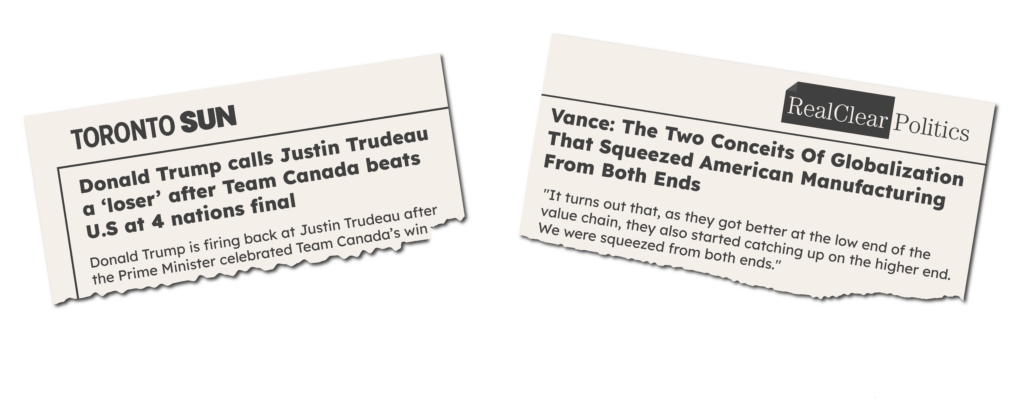
Sources: Toronto Sun, RealClearPolitics
A month later, US Vice President J.D. Vance echoed the sentiment. Globalisation, he suggested, had never truly offered weaker states a path to rise – only a place to find their niche. Any upward progress they had made came despite those original designs, not because of them. The implication: large, wealthy nations had conceded too much of their original advantage and were now justified in reclaiming it.
Vance was not the first to question the idea of global competition as a win-win. For decades, powerful states like the US had championed that vision – and perhaps come to believe its own publicity material. That era appears to be ending. Power is reverting to those who were strong from the outset, and their continued ascent is framed as natural and inevitable, regardless of rules, ethics or past consensus. If nothing else, the message had the appeal of honesty.
That same desire to expose hypocrisies is now playing out on the ice, track and field. More and more, athletes are challenging the rules not to win within the system, but to expose its biases. In 1998, figure skater Surya Bonaly landed a backflip in the Winter Olympics – fully aware it would get her disqualified. It was a personal rebellion born out of frustration, and it effectively ended her career. When Adam Siao Him Fa did the same in 2024, he framed it as a “positive rebellion” and launched the “#Backflip4Everyone” campaign against the ban.
In this new era, rule-breaking is not subversive – it is useful. If the referee calls foul, it only confirms what many already suspect: the game was never fair to begin with.
2. Performance without the pretence
The logic of this new era is especially clear when it comes to doping — a practice that has historically surged when upstart powers sought to challenge entrenched international norms, particularly when prestige was at stake between incumbents and newcomers. During the Cold War, the Eastern bloc covertly used performance-enhancing drugs to project vigour. Russia revived the approach in the 2010s, seeking to subvert the World Anti-Doping Agency (WADA) tasked with oversight. Crucially, these efforts remained covert: doping was effective only so long as it was denied. Victory still depended on the appearance of legitimacy.
The forthcoming Enhanced Games, backed financially by figures including Donald Trump Jr. and Peter Thiel, embody a broader shift towards open enhancement in sporting competition. At the Enhanced Games, doping is not hidden – it is the whole idea. The Games operate outside Olympic frameworks, rejecting governing bodies and regulation. Scientific experimentation is open, and entry is driven by access to money and expertise. What emerges is not merely a new game, but a new competitive logic. Players are testing themselves in an unfair, man-made environment. And competition and victory are merely a pretext for players’ real goal of radical self-enhancement.
That same competitive logic is visible in state behaviour. Like the participants in the Enhanced Games, many governments have abandoned the pretence of compliance, getting ahead by means of enhancement instead. Saudi Arabia has been accused of using wealth to deflect scrutiny over war crimes and assassinations; Russia and North Koreaintegrate criminal networks into state operations. These are not rule violations – they are rejections of the very idea that rules apply.

Sources: Sportico, France 24
For all the talk of covert and hybrid warfare, these transgressions are no longer secret – visibility appears to be the point. Whereas Cold War abuses like doping or covert interventions were hidden, today they are public; the smirking denial signals impunity. Israel’s operations in Syria, justifiable on security grounds but controversial under international law, sometimes appear less about territory than about asserting freedom of action.
The Enhanced Games do not just signal that the rules are changing, they show they are now optional. That is because, in sport as in statecraft, the contest is no longer about performance within a shared system but altering the terms of competition itself.
3. Rejecting the ideal body politic
The depth of today’s competitive transformation is clearest when we look at what is considered “aspirational”. In both sport and statecraft, long-standing ideals and physical standards are losing their authority. For much of the modern era, excellence meant conformity, policed through relentless gatekeeping. Athletes who deviated – through disability, race, gender or identity – were not just overlooked; they were disqualified. Even as access widened, the image of the “aspirational” body remained intact: toned, symmetrical, complete.
The same logic shaped the body politic. States were expected to conform to the winner’s model of legitimacy – liberal, decentralised, lean. Those that resisted were labelled “failed”, while those that complied faced shifting demands: democratisation, market reform, structural adjustment. Each step was presented as the last, but it never was.
Athletes are now moving beyond externally imposed ideals of the “aspirational” body and honing what is most effective and resilient. When Australian hockey player Matt Dawson suffered a finger injury ahead of the Paris Olympics, he chose immediate amputation over reparative surgery that would mean missing the Games. The classic aesthetic ideal of completeness was less important than operational sufficiency.
States are beginning to make similar choices. Post-colonial states are now amputating parts of the state they retained even under neoliberal pressure to slim down. National airlines, prestige summits, ceremonial sovereignty – the state’s equivalent of couture team outfits at the Olympics flag parade – are likely to be discarded.

Sources: The Guardian, Reuters
Effectiveness is being redefined. Rather than replicating a fixed model, many challengers now assemble the building blocks of power – coercion (the means of violence), capital (the power to extract money from people and resources from territory) and kudos (the authority to determine which information and opinions are valid) – using methods that once seemed incompatible: authoritarian regimes partnering with criminal networks, bureaucracies embracing innovation, democracies opting out of international norms. These deviations from the accepted norm no longer signal failure – they reveal new forms of enhancement.
4. Using efficient wastefulness as gameplay
By adopting these strategies, states are better able to access the resources needed to compete. Access to capital, know-how, technology and manpower is prioritised over traditional markers of statehood – even those long held to be fundamental like the monopoly on violence, financial centralisation or international legitimacy. Russia’s use of mercenaries weakened its monopoly on violence, but allowed it to access an estimated US$ 2.5 billion in gold in 2022-2023 alone and to mobilise at least 48,000 inmates for the war in Ukraine.
Not the polished states, but the paradoxical ones now thrive: overbuilt, off-centre and relentlessly able to compete.
In today’s competitive landscape, the winning strategy is no longer lean efficiency – it is managed excess. Elite cycling shows how the logic has shifted: controversial new training techniques like carbon monoxide inhalation give riders surplus capacity that they can waste tactically to control tempo, provoke mistakes and overload rivals. Performance comes not from conserving energy, but from knowing when and how to spend it.
States are adopting the same approach. Capacity, not compliance, is the new currency of advantage. The goal is no longer to fit a model, but to survive pressure, route around constraints and overwhelm when needed. China exemplifies this shift. It tolerates and even subsidises waste – flooding sectors with entrants, capital and overlapping supply chains. Many fail, but survivors emerge hyper-fit, globally dominant and supported by dense ecosystems. The pattern repeats across solar panels, Electric Vehicles and robotics – an investment ecosystem likened to a “Chinese fitness gym”, where foreign businesses immerse themselves to sharpen their capabilities.
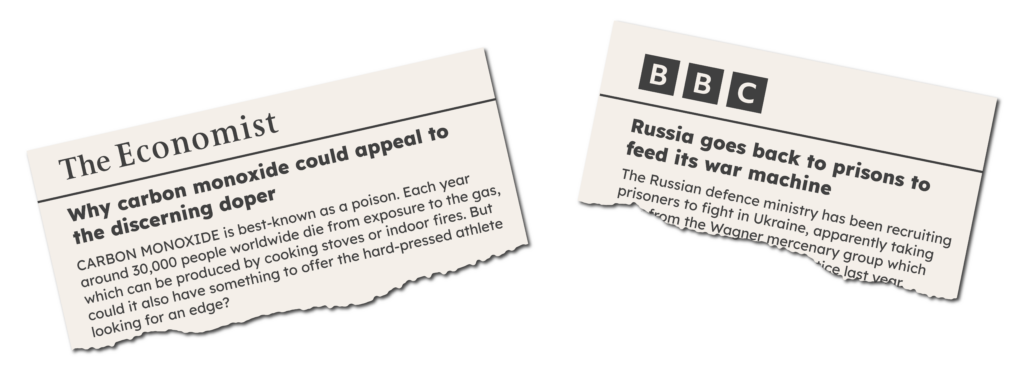
Sources: The Economist, BBC
Other states have adapted this logic. In varying forms, Russia, Iran and the United Arab Emirates (UAE) have embraced a politics of deliberate redundancy. Three principles shape this model of “efficient wastefulness”:
– Burden-sharing: semi-autonomous partners are largely self-sufficient and bear their own costs. Private Military Contractors like Russia’s Wagner Group or the UAE’s Black Shield provide expertise, manpower and flexibility – financed through mercenary contracts and, at times, criminal enterprise. This reduces financial and political costs to the state.
– Inbuilt redundancy: multiple partnerships ensure that if one channel fails, others remain. Iran’s ties to multiple armed non-state groups mean that Israel’s neutralisation of Hamas has not ended its influence. Redundancy also supports contradictory strategies – like Russia’s centralised mobilisation at home, paired with decentralised operations abroad.
– Plausible deniability: even in an era of strategic visibility, states break rules selectively. They delegate risky action to loosely affiliated actors, avoiding direct accountability. Wagner’s atrocities or China’s use of criminal networks to harass Taiwan are not exceptions – they are tactics. When needed, these actors can also disown their sponsors, creating a two-way smokescreen.
The ideal body politic today is not lean or symmetrical. It is layered, off-centre and built for turbulence – its strength drawn not from transparency or order, but from the ability to saturate, over-supply and compete through contradiction.
5. Global vigilantism and the limits of transformation
In the recent past, statehood was formally policed – those that veered too far from the template were subject to containment, sanctions or tutelage by the international community. Today rules are being bent, identities reshaped, ideals of legitimacy discarded.
This may sound like an emerging international order open to all-comers. But in fact, the reverse is true. The old model has given way to a new kind of vigilantism: discretionary, ideological and increasingly pre-emptive. Efforts to reform the old order and make it more inclusive have run their course. Aggressive challengers cite the old double standards to justify rule-breaking. And dominant powers repackage others’ grievances to the same ends.
Some adaptations are celebrated; others are condemned. Transformations backed by authoritarian capital – particularly in the Gulf – are praised as pragmatic or visionary. Liberal democratic reconfigurations, from Ukraine’s decentralisation to the EU’s regulatory assertiveness, are dismissed as overreach.
The same topsy-turvy logic appears in sport. Doping is welcomed because it reassures players that a natural order is being reasserted. Champions of the Enhanced Games celebrate pharmacological ambition as freedom, while deriding other forms of transformation as delusion or decline.
In both sport and diplomacy, transgressions against a supposedly natural order face harsher penalties when they threaten existing hierarchies. Athletes like Imane Khelif and Lin Yu-ting, whose appearances challenge narrow ideals of femininity, are met with suspicion and subjected to invasive “transvestigations”. Their success becomes grounds for delegitimisation.
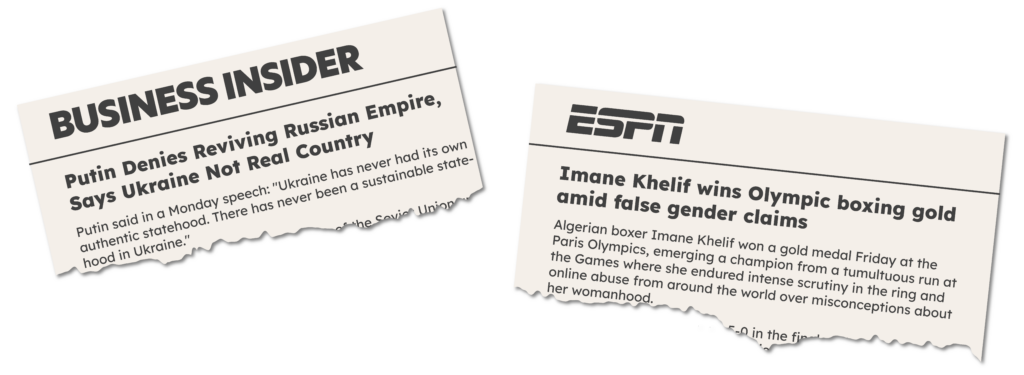
Sources: Business Insider, ESPN
The pattern is consistent. Ukraine’s liberal credentials have not shielded it from being framed as “not a real country”; Canada is told it is not viable as an independent state and Kosovo has faced a loss of recognition from countries that once affirmed its statehood. A state’s interdependence is becoming a vulnerability, and its acceptance, something provisional.
6. The brutal assertion of hierarchies and spheres
Reflecting the broader shift toward self-enhancement, Gen Z — shaped by pandemic-era disruptions and environmental pessimism — is turning inwards, gravitating toward gym culture, self-optimisation and habit-tracking. Over 85% of gym-goers now exercise three or more times a week, many following multiple routines. They are prepping as if for societal collapse, ultra-fit, disciplined, independent and increasingly isolated from real life. They report seeing socialising as riskyand inefficient. More generally societies are growing intolerant of those who pose demands of them, whether because of their vulnerability or poor life choices. They are retreating into a world they feel they can control, even if this is an illusion.
States are exhibiting similar behaviour. Faced with mounting system shocks and environmental strain, many are seeking to reduce strategic dependency and avoid entanglement. Even close partners — such as Canada and Ukraine — may, in some quarters, be perceived less as strategic assets and more as sources of ongoing obligation, especially when domestic resilience is under pressure. In this climate, some powers are prioritising relationships with geopolitical “gym buddies”: self-reliant actors who offer capability without complication, and who seek mutual recognition rather than deeper integration.
This trend – the assertion by autonomous great powers of their place atop a hierarchy, their mutual recognition of one another’s insulated spheres and their often brutal signals to smaller states that they will be left alone so long as they remain quiet and deferential – may help explain the renewed academic interest in 19th century concepts like the concert of powers and spheres of influence. But once again, sport offers a better metaphor.
In the early 1930s, Britain retreated from global responsibility, consolidating the empire as a zone of safety where it assumed it would remain politically dominant and strategically unchallenged. The illusion was shattered over the course of cricket series where England seemed set to lose to a dominion. Australia were faster, more confident and better adapted. So England escalated, deploying fast, hostile “bodyline” deliveries aimed at the batsman’s body, quite literally putting the Australians back in their place. It won the match – but at the cost of Britain’s moral authority at a moment when it would soon need allies.
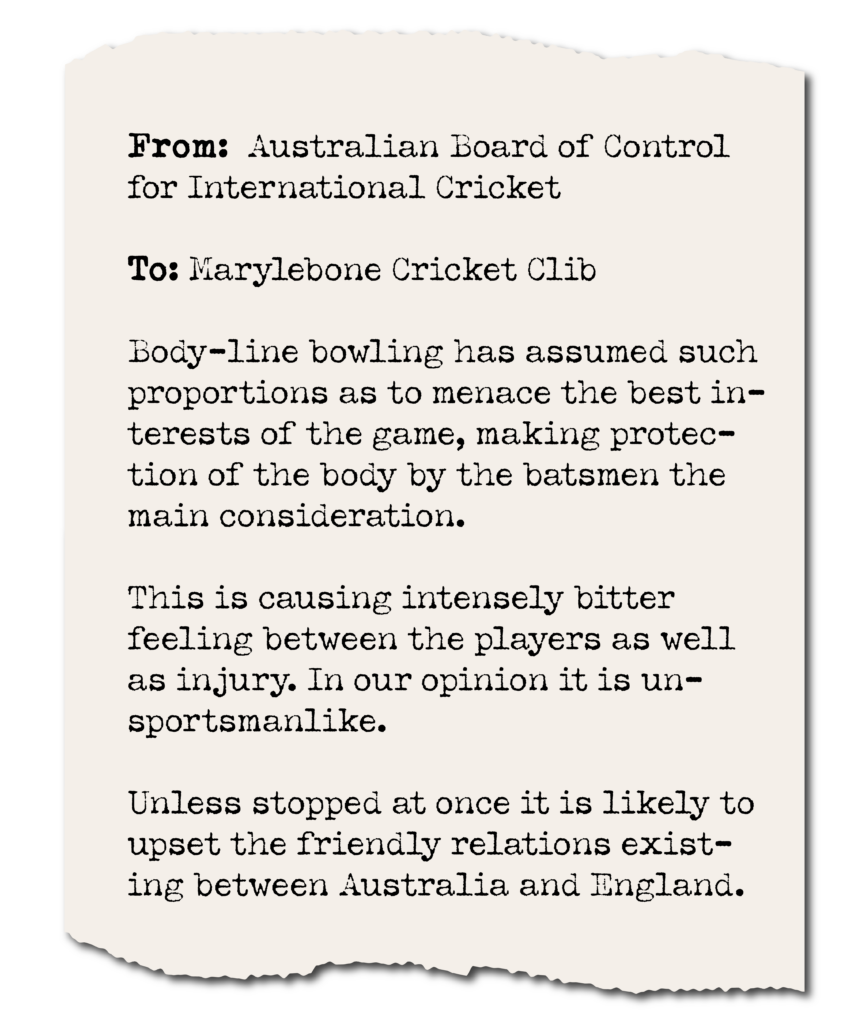
Source: National Museum of Australia
Spheres of enhancement
By invoking a return to “natural order” – a rivalry between big beasts with animal instincts – great powers present the new order as inevitable. Their citizens, neighbours and dependent states are expected to accept dominance, extraction and raison d’état. But this is not a return to 19th century rivalry or its remedy, spheres of influence. It is something less stable: a period of open-ended experimentation. This is made clear in a radical change to the nature of rivalry. Competition was once a social logic, requiring mutual awareness and shared rules. It offered recognition – in power or in progress. That logic is eroding. States still cite the need to compete, but increasingly this is just a pretext for honing their domestic governance. They build inward-facing systems for transformation, designed to absorb pressure and deflect oversight.
These are not spheres of influence. They are spheres of self-enhancement: spaces where states turn inward to reengineer themselves, shielded from scrutiny, but still drawing on global flows of data, labour and resources. Classical geopolitics was shaped by fears of crowding – rising populations, rival ambitions, the scramble for territory. Overreach led to retrenchment and stagnation. Today, geopolitics is again driven by a sense of shrinking, but for a different reason: the planet itself is becoming less habitable. Survival is threatened not only by other powers, but by system shocks – climate change, over-extraction, pandemics.
In response, states are retreating from the world to build resilience. But they are also exploiting the collapse of old norms – experimenting with tools and techniques that would once have been constrained. This is not a drift into stasis. It is a moment of radical opportunism. Russia is reinforcing its Arctic frontier with floating nuclear reactors, shipping routes to carry back extracted resources and sanction-proof infrastructure. China is fusing ecological control with behavioural management, redirecting rainfall and consumption alike. India is engineering around disaster, linking rivers and distributing welfare through biometric ID. Each sees instability not as a threat, but as an operating condition.
These features are not restorations. They are new – and still forming. The Enhanced Games offer a clearer analogue than the jungle. Drawing on Girard’s warning that rivalry leads to imitation, stagnation and ultimately war, the Games abandon the conventional rules of competition and adaptation. They present enhancement as spectacle, and impunity as a mark of autonomy.
The seeds of war
This moment of radical, hypermodern experimentation is widely misread as a return to the 19th century. But this is a category error. Analysts speak as if we were going back to a world of sealed territorial blocs, stagnant great power concerts and placid minor states that know their place. But this is not a world of equilibrium:
– Territory can no longer be held. Land and populations are valued not for control, but for what they can yield – critical minerals, sanction-proof capital, proprietary knowledge. States aim to extract from their fringes without entanglement, using mercenaries and proxies. This is a world becoming less habitable. And as NATO has noted, holding ground is growing harder. What cannot be secured will be contested. The logic of enhancement pulls powers back into rivalry, even as they try to opt out.
– Enhancement will not stay contained. AI militaries, genomic surveillance, geoengineering, post-national financial systems – none remain within borders. Even when great powers proclaim a desire to “stay in their lane”, their innovations ripple outward. And increasingly, great powers signal their autonomy not through cooperation or classic competition, but through impunity – deliberate breaches of diplomatic and ethical norms to show they are unbound.
– Smaller states will act as rogue enhancers. No longer content as buffers or clients, smaller powers are using this moment to scramble hierarchies and revive old regional ambitions. The UAE combines mercenary projection with state-backed venture capital. Iran leverages dual-use biotech and nuclear with proxy warfare. Rwanda turns its neighbours’ conflict minerals into a tech-industrial base. Singapore fuses sovereign capital with algorithmic surveillance.
The historian Charles Tilly once wrote that early modern states used war to make themselves stronger – to build armies, collect taxes and centralise power. That logic is resurfacing. The Enhanced Games treat conflict not as a contest to win, but as a pretext for competitors to hone and harden themselves. States treat war as a way to make themselves more powerful and resilient.
Iran and Russia were among the first to mutate under pressure of war. Through proxy networks and informal extraction, they built buffers, tested new forms of rule and turned conflict into a tool of statecraft. What began as wartime improvisation became embedded in their domestic systems – shaping how they govern. But these capabilities can be easily used for war again.
We often talk about the future of warfare – faster, multi-domain, confusing. But the more important shift may be in the war-makers themselves: hardened by conflict, shaped by pressure and moving down divergent paths of state transformation. It is not hard to imagine how this mix might explode – when war becomes less a last resort than a means of self-reinvention.
NATO, the EU and the future of war-makers
From a European perspective, some forms of enhancement must be shut down: outsourced logistics that obscure command and control; subcontracted violence that enables deniability; and financial or data systems that enable coercion without accountability.
Others must be adapted – sovereign tech platforms, modular deterrents, off-balance-sheet cyber units. These need interoperability, legal oversight and doctrinal grounding. Still others must be shared. Structured pathways for sovereign capability – AI testbeds, logistics redundancy, resilience guarantees – should allow smaller states to enhance without destabilising the system.
How to make this real, and leverage Euro-Atlantic power?
NATO and the EU were early models of collective enhancement. NATO pooled allied capabilities to deliver an efficient force, from Cold War deterrence to 21st century “just-in-time warfare”, where logistics mirrored supermarket supply chains. The EU enabled cross-border integration, giving small and large states alike tools to shape their environment. Together, they countered conventional threats through systemic transformation – then locked in their advantage through legal and technical norms.
That edge risks slipping. Other powers are building strategic redundancy – a kind of “efficient wastefulness”. Critics say Europe risks drifting into sheer wastefulness. Allies are asked to signal loyalty with symbolic spending. EU states risk duplicating US capabilities rather than innovating in radical new ways.
Meanwhile, the categories that once anchored the Alliance are blurring: public and private, legal and illegal, state and non-state. Regimes act against type: pariah states use licensed contractors; autocracies adopt democratic forms; criminal networks serve government aims. Euro-Atlantic governments risk losing initiative – and with it, the power to set the terms of engagement.
NATO and the EU remain capable. The question is: what will they choose to make possible?
Table 1 – A comparison between spheres of enhancement and other patterns of inter-state competition
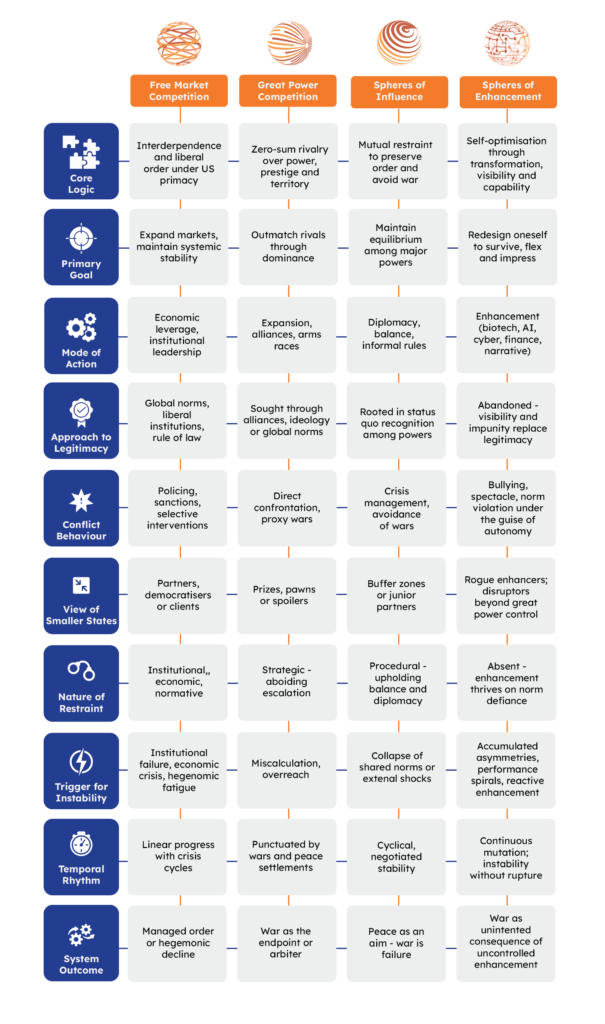
Source: authors’ own, 2025
__________
The views expressed in this publication are solely those of the authors and do not necessarily reflect the views of the Centre for Security, Diplomacy and Strategy (CSDS) or the Vrije Universiteit Brussel (VUB).
ISSN (online): 2983-466X








